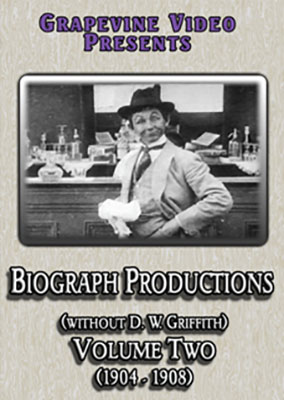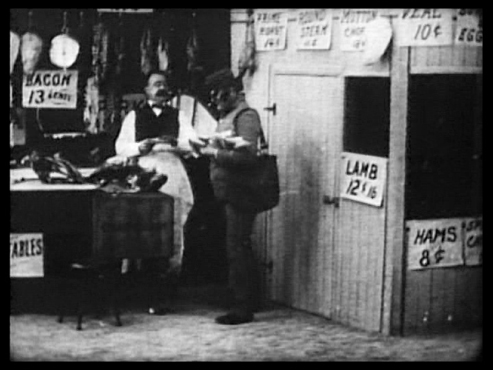
Reviews of silent film releases on home video.
Copyright © 1999-2024 by Carl Bennett
and the Silent Era Company.
All Rights Reserved. |
|
Biograph
Productions
Volume 2
(1904-1908)
|
Contents: Personal (1904), The Silver Wedding (1906), The Black Hand (1906), The Paymaster (1906), Married for Millions (1906), Mr. Hurry-Up of New York (1907), The Tired Tailor’s Dream (1907), An Arcadian Elopement (1907), The Boy Detective; or, The Abductors Foiled (1908), The Sculptor’s Nightmare (1908) and When Knights Were Bold (1908).
This collection of short comedies and dramas by the American Mutoscope & Biograph Company gives a brief peek into the production methods and story quality of their films before D.W. Griffith began directing for the company.
Personal (1904) is the original version of a popular chase comedy that inspired two knockoff remakes by Edison and Lubin.
The Silver Wedding (1906) exposes a gang of New York thieves of pickpockets and ersatz beggars, some of whom arrange a daring robbery of an upscale wedding party then try to escape through the sewer system.
The Black Hand (1906) may be the earliest American film depicting the Mafia, as a New York gang kidnaps a meat butcher’s daughter for a ransom of $1,000.
The Paymaster (1906) is a domestic drama of the corruption of a mill superintendent who frames the paymaster for embezzlement and threatens the young girl mill worker who loves him.
Married for Millions (1906) is an episodic comedy of a man who hardly has the money to marry, but then must deal with his new harridan wife.
Mr. Hurry-Up of New York (1907) is another comedy of modern life in the big city as Mr. Hurry-Up, as busy as he is, must deal with a toothache and his own administration of alcoholic painkillers.
The Tired Tailor’s Dream (1907) is chiefly a stop-motion animation showpiece as a tailor’s tools magically craft a suit by themselves.
An Arcadian Elopement (1907) is a comedy of a couple that elopes, and the groom causes trouble for others during their honeymoon.
The Boy Detective; or, The Abductors Foiled (1908) is a drama of a newspaper boy who foils a kidnap attempt and helps bring the criminals to justice.
The Sculptor’s Nightmare (1908) is a disjointed comedy of a reveling sculptor who is put in jail, where he dreams of busts of political figures that shape themselves by means of stop-motion cinematography.
When Knights Were Bold (1908) is a historical drama (written by D.W. Griffith) of young lovers separated by the king’s orders, who effect their reunion when they expose court intrigue.
What is most apparent in evaluating these early films is the nearly-total lack of structured storytelling. Most of the films are hastily-drawn sketches, born of a decade-long tradition of action over story and characterization, with When Knights Were Bold (1908) being a transitional film.
— Carl Bennett
|
 Grapevine Video Grapevine Video
2010 DVD edition
Biograph Productions, Volume 2 (1904-1908), black & white, 101 minutes total, not rated,
including Personal (1904), black & white, 7 minutes, not rated, The Silver Wedding (1906), black & white, 9 minutes, not rated, The Black Hand (1906), black & white, 9 minutes, not rated, The Paymaster (1906), black & white, 10 minutes, not rated, Married for Millions (1906), black & white, 10 minutes, not rated, Mr. Hurry-Up of New York (1907), black & white, 9 minutes, not rated, The Tired Tailor’s Dream (1907), black & white, 8 minutes, not rated, An Arcadian Elopement (1907), black & white, 10 minutes, not rated, The Boy Detective; or, The Abductors Foiled (1908), black & white, 7 minutes, not rated, The Sculptor’s Nightmare (1908), black & white, 9 minutes, not rated, and When Knights Were Bold (1908), black & white, ? minutes, not rated.
Grapevine Video, no catalog number, UPC 8-42614-10380-3.
One single-sided, single-layered, Region 0 NTSC DVD-R disc, 1.33:1 aspect ratio image in windowboxed 4:3 (720 x 480 pixels) interlaced scan MPEG-2 format, SDR (standard dynamic range), 6.0 Mbps average video bit rate, ? Kbps audio bit rate, Dolby Digital 48 kHz 2.0 stereo sound, English language intertitles, no foreign language subtitles, 11 chapter stops; standard DVD keepcase; $14.95.
Release date: 15 February 2010.
Country of origin: USA
Ratings (1-10): video: 6 / audio: 5 / additional content: 0 / overall: 6.
|
|
This DVD-R collection of early American Mutoscope & Biograph Company short films has been mastered from 16mm reduction prints from the Library of Congress paper print collection that are of varying quality.
Personal (1904) has been mastered from the good 16mm circulation print prepared by the Library of Congress from Kemp Niver’s paper print 16mm restoration of the 1950s. A little flat and soft in detail, this probably is about as good as the film will look until a 35mm restoration is completed. Accompanied by the muted piano score from the source print.
The Silver Wedding (1906) has been transferred at faster-than-natural-speed from a very-good 16mm reduction print from the Library of Congress that is dark in its shadow detail and a bit jittery in its framing. Accompanied by a theatre organ score.

The Black Hand (1906) has been mastered from a very-good 16mm reduction print that is a bit flat and jittery, with dark shadow details. Accompanied by a canned orchestral music score.
The Paymaster (1906) has been transferred from a good 16mm reduction print that has the typical paper print restoration frame jitters, some blasted-out highlight details and plugged-up shadows. Accompanied by an orchestral music score lifted from a film soundtrack.
Married for Millions (1906) has been mastered from a very-good 16mm reduction print that is a bit contrasty, with plugged-up shadows, and is steadier than other paper print restorations. Accompanied by a canned orchestral music score.
Mr. Hurry-Up of New York (1907) has been transferred from another of the paper print 16mm reduction prints, which is of good to very-good quality, with OK highlights but some dark shadows. Accompanied by a canned orchestral music score.
The Tired Tailor’s Dream (1907) has been mastered from a good 16mm reduction print that is is rougher and flatter in its grey levels than other source prints in the collection. Accompanied by a theatre organ score.
An Arcadian Elopement (1907) has been transferred from a good to very-good 16mm reduction print that has some frame jitters and exposure fluctuations. Accompanied by the muted electric organ music score from the source print.
The Boy Detective; or, The Abductors Foiled (1908) has been mastered from a good to very-good 16mm reduction print that is a bit contrasty. Accompanied by a canned orchestral music score.
The Sculptor’s Nightmare (1908) has been transferred from a good to very-good 16mm reduction print that has some frame jitters and exposure fluctuations. Accompanied by a canned orchestral music score.
When Knights Were Bold (1908) has been mastered from a good to very-good 16mm reduction print that has frame jitters and exposure fluctuations, and is a bit contrasty. Accompanied by a theatre organ score.
Several of these films have not been available on home video since their release on VHS videotape by Kartes Video Communications in the 1980s. With this DVD-R edition, the films are presented in slightly improved visual quality. The Black Hand (1906) looks better elsewhere, but this is otherwise a recommended collection until new editions of these films are prepared from 35mm print materials.
|
|
USA: Click the logomark to purchase a Region 0 NTSC DVD-R of this edition from Amazon.com. Your purchase supports Silent Era.
|

|
|
|
This Region 0 NTSC DVD-R edition is available directly from . . .
|

|
|





































